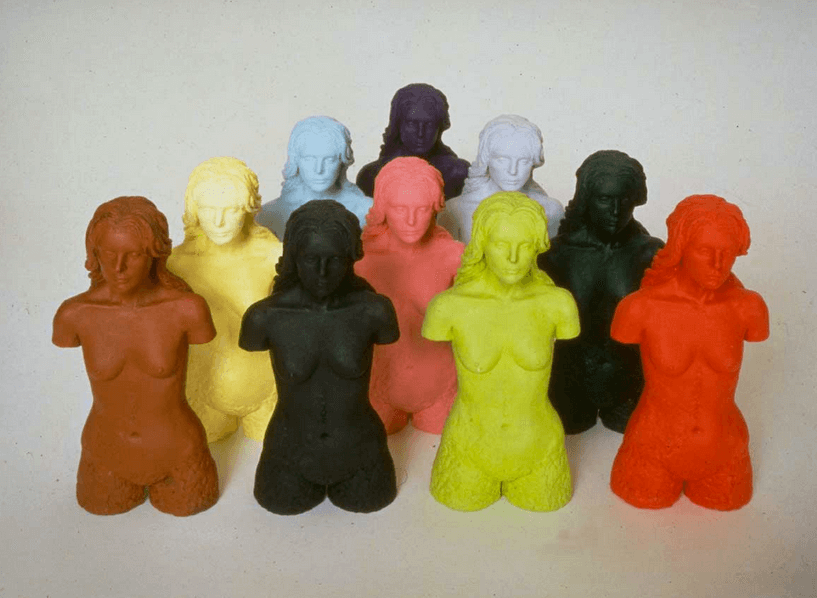#YesAllWomen vs #NotAllMen: The Case Against Nuance


Hannah Wilke, “Venus Pareve”
There are stories every woman knows. One is a story about the man who walks by you on the street, leaning in close just as he passes, so he can whisper, “Nice titties, girl.” One is a story about the man who tells you to smile, and when you don’t, spits at you, “Bitch!” One is a story about the man who stands too close on the subway, and even though you stand very still and tell yourself that maybe he’s just doing that because it’s crowded, you can’t deny why he’s there once you feel him press up against you, harder and harder. One is a story about the man who won’t listen to you when you tell him “no” because he doesn’t think “no” is an answer he needs to respect, so he pushes you until you say “yes.” One is a story about the man who doesn’t wait for you to say “yes,” he doesn’t mind hearing your “no no no no”—maybe he likes it more. One is a story about the man who calls and calls or texts and texts or follows you home because he thinks you belong together or, wait, no, he thinks you belong to him. One is a story about a man calling you emotional or hysterical or crazy because you don’t see things the way he wants you to see them. One is a story about a man telling you that you must be uptight or frigid or that there must be something wrong with you and that you’re not normal, all because you don’t want to sleep with him. One is a story about a man who says he’s a “nice guy” and then asks you why women are all such bitches. One is a story about feeling scared walking home alone at night (or even during the day) and so you clutch your keys in between your knuckles or you squeeze a bottle of Mace in your fist, and then you get home safe and text your friends to let them know you’ve gotten home safely, something no man ever needs to do. These are the stories of all women. Yes, all women.
On Saturday, 22-year-old Elliot Rodgers went on a shooting spree in California, massacring six people before turning the gun on himself. Rodgers left behind a 137-page manifesto which, along with several YouTube videos, explained the motivation behind the killings. The manifesto details Rodgers’s hatred of women (“I concluded that all women are flawed. There is something mentally wrong with the ways their brains are wired, as if they haven’t evolved from animal-like thinking”), his feelings of rejection and rage, the shame he felt because he was a virgin (“I can’t be satisfied with life if I am a virgin and girls are repulsed by me”), and his desire to make women suffer for the pain they’ve inflicted on him (“I will destroy all women because I can never have them”). Some of the ways Rodgers wanted to “destroy all women” include containing them all in concentration camps and experimenting on them by, among other things, inseminating them. But Rodgers ultimately decided on a singular “Day of Retribution,” upon which he would make his apartment into a place of torture, so that he could “cut them, flay them, strip all the skin off their flesh, and pour boiling water all over them while they are alive… things will be fair once [he] could make them suffer as [he] did. [He] will finally even the score.” That Day of Retribution was May 24th.
Not long after Rodgers murdered six people, his manifesto and YouTube videos (which are just as deranged and disturbingly misogynistic) were discovered, and the hashtag #YesAllWomen took shape on Twitter, where it has been trending now for the past three days. #YesAllWomen is filled with individual women’s traumatic experiences (“Because of a party more than 25 years ago I still wish I hadn’t gone to, and still find it hard to talk about”), intimidating interactions and explicit threats (“Because the same ‘harmless’ misogynist rhetoric that fills up my inbox every day also fills a mass murderer’s manifesto“), the systemic sexism that is cast as being pro-woman (“#YesAllWomen because men are told not to hurt women because she might be tied to a man. “She’s someone’s mother/sister/wife/daughter“), and, of course, this Margaret Atwood quote: “A man’s worst fear is that a woman will laugh at him, and a woman’s worst fear is that a man will kill her.” The passion with which women latched on to this hashtag was impressive in its force, and transcended the actions of Rodgers in order to shine a spotlight on the entrenched misogyny that’s accepted in this society (and the world at large); it’s hashtag activism as catharsis, and it’s allowed many women—even those who have no problem using their voices in other arenas—feel comfortable and safe enough to share their darkest experiences.
But as is so often the case when women share their stories (especially when it’s done collectively in a public forum), a backlash was born. Some of the responses pointed out that Rodgers’s actions weren’t simply the work of a misogynist, but were rather due to his (evident) mental illness. This is doubtlessly true. Rodgers was mentally ill. Rodgers was also the owner of multiple guns (about 400 rounds of ammunition and three semi-automatic weapons were found in his car), several of which he used on his rampage. The father of one of the victims, Christopher Michael-Martinez, spoke about that this weekend, saying, “Why did Chris die? Chris died because of craven, irresponsible politicians and the N.R.A. They talk about gun rights. What about Chris’s right to live? When will this insanity stop? When will enough people say, ‘Stop this madness; we don’t have to live like this?’ Too many have died. We should say to ourselves: not one more.” And so, the reasoning goes, Elliot Rodgers might have been a woman-hater, but that’s not why he killed all those people: “Hey, not all misogynists are murderers! This guy was just crazy. And he had a lot of guns!”
And so, in effect, the people who dismiss #YesAllWomen, are of a kind with those who feel that “not all men” are a part of the patriarchy, or, for that matter, that “not all white people” are privileged. The people who dismiss #YesAllWomen feel comfortable doing so because they are secure in the knowledge that not all women are raped and not all women are afraid of walking home alone at night and not all men are misogynists and, even if a man is a misogynist, well, then, not all misogynists are murderers. These people are asking for nuance so that they can be exempt from the larger, serious problems that pervade our society—a society of which Elliot Rodgers is a symptom, not merely an aberration. But this is not a time for nuance. This is not a time to excuse the countless men who simultaneously value and condemn women for their sexuality. This is also not a time for nuance when it comes to the issues of gun control or providing adequate health care for people with serious mental issues. Too frequently, important conversations are derailed (especially that of gun control) because defenders of he status quo will make a plea that seems like it’s based on rationality (“what about the hunters?”), when it’s really just a way to dismiss the larger issue (guns are machines designed to kill, that this country doesn’t regulate them to the extent that it does birth control is insane).
In what is maybe the best work about the importance of a woman’s voice—I Love Dick—Chris Kraus writes, “if wisdom’s silence then it’s time to play the fool.” For too long, women have suffered in silence, fearing that they will cause more damage for themselves by speaking out, knowing that their stories will be dismissed by men who claim to be different and who can’t imagine what it’s like not to enjoy male privilege. With #YesAllWomen, we are able to respond to men like Elliot Rodgers and to men who hide behind the banner of “not all men.” And even though we know we will be called fools or told to be quiet, we can still keep speaking out, because this is no time to be silent. There is no wisdom in silence and there is no strength. Our power is in our collective voice, and now is the time to speak out.
Follow Kristin Iversen on twitter @kmiversen
You might also like 




















